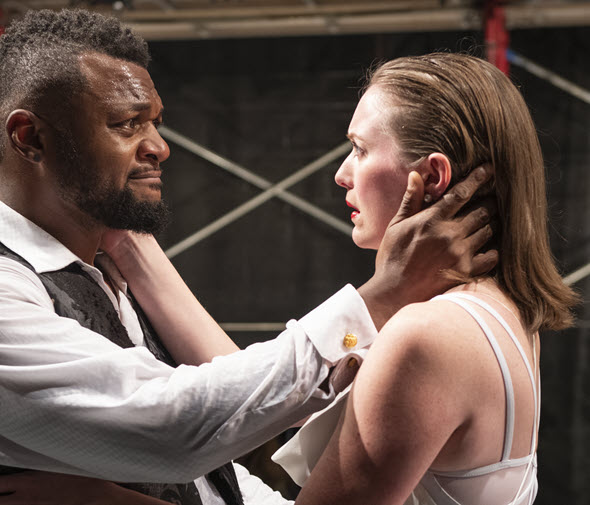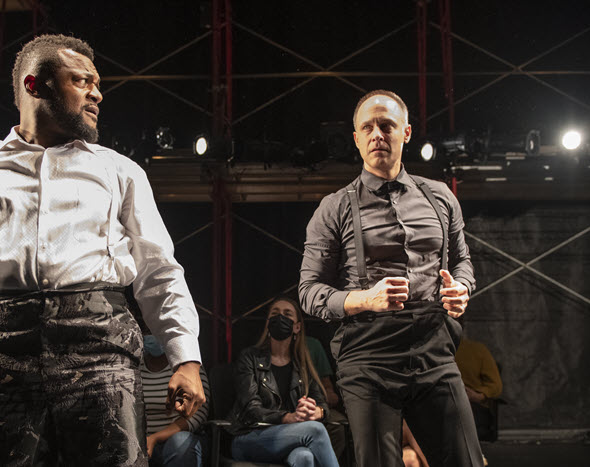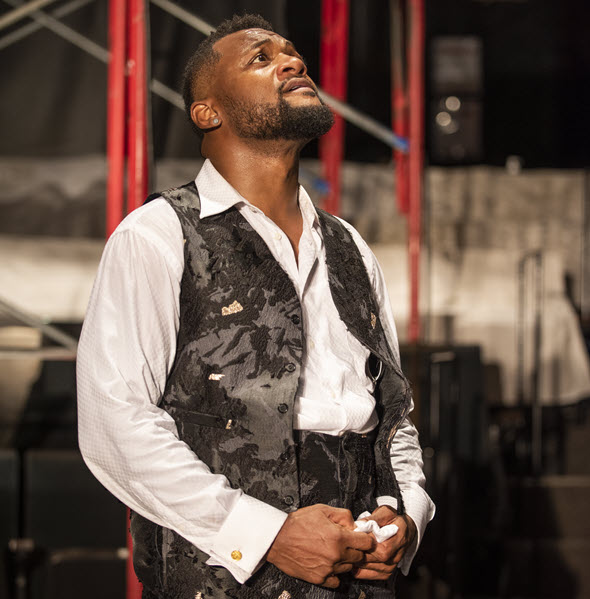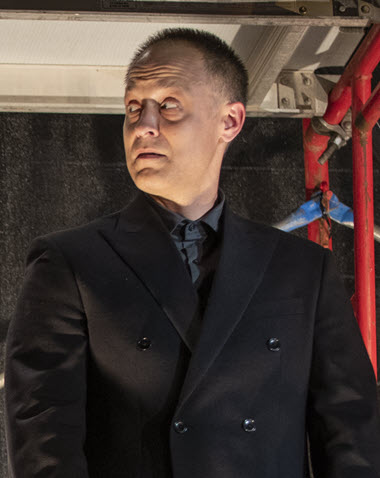‘Othello’ at Court: A tragedy at arm’s length. (Poor Desdemona, exiled to high scaffolding)

Once Othello (Kelvin Roston, Jr.) begins to think that Desdemona (Amanda Drinkall) may be unfaithful, tragedy swiftly follows. (Court Theatre photos by Michael Brosilow)
Review: “Othello” by William Shakespeare. At Court Theatre, extended through Dec. 5. ★★
By Lawrence B. Johnson
The age-old question attached to Shakespeare’s “Othello” has never concerned what the play is about. it’s about the green-eyed monster jealousy as an instrument of single-minded vengeance for a perceived slight. No, the issue that has fascinated scholars, directors, psychiatrists – Verdi! – is whom this headlong, relentless tragedy is about: the proud Moorish general, fearless and seemingly invincible and yet marked by his own Achilles heel, or his comrade-in-arms and unsuspected nemesis Iago, bitterly stung when Othello names someone else as his chief officer and hellbent on bringing his commander down.
This perpetual conundrum is neatly sketched in a Court Theatre production of “Othello” that otherwise leaves too much on the cutting room floor and, in its overwrought stylized mannerisms, loses sight of a thousand nuances, then simply throws away the drama’s tragic consummation. The show is co-directed by Gabrielle Randle-Bent and Court artistic director Charles Newell.

Othello doesn’t realize that he’s being played by his resentful officer Iago (Timothy Edward Kane). whose duplicity causes Othello to destroy himself.
“Othello” is a battle to the death between two warriors, only one of whom knows he’s engaged in the struggle. The play is about Othello only in the sense that he is the powerless manipulated object of certain ruin. Apart from reacting to Iago’s simmering innuendoes, Othello doesn’t really take action – with the key exception of suspending his officer Cassio after a brawl. The drama’s progress, the nefarious process of the great general’s disintegration, is sustained by Iago. So well is this shadow contest played out by Kelvin Roston, Jr., as Othello and Timothy Edward Kane as Iago, that one almost forgets how Shakespeare’s intricate play is at the same time being eviscerated by the directors’ choices.
Roston invests Othello with a fetching mix of incredulity that fair Desdemona might have betrayed him, progressive submission to Iago’s finely calculated intimations, and pure, hot passion. In what is doubtless his role debut, Roston, a veteran of Chicago stages and always a compelling presence, might be viewed as a formidable Othello in the making. At the performance I saw, he tended to press a bit and sometimes rushed his lines. But the deeper Othello wades into the undertow of Iago’s duplicity, the more focused and persuasive Roston’s performance grew.

Chicago actor Kelvin Roston, Jr., a formidable Othello in the making, is surrounded by multi-level scaffolding that also rims the audience.
He was not helped by a bizarre staging concept that minimizes real interaction in favor of indirection, entirely excises Othello’s horrific denunciation of his wife in front of high-ranking emissaries from Venice and finally deprives him of the actual murder of his wife. That chllling moment is here converted to a figurative encounter in which she says her evening prayers on an upper level of the set while he mouths “Put out the light, and then put out the light” on the lower level. We need to see poor, deluded, destroyed Othello put his hands on his innocent Desdemona and take her life. Talk about suspending disbelief.
The one-sided game between Roston’s crumbling general and Kane’s insidious Iago works as it inevitably must, through Kane’s quiet brilliance as the psychological stalker, whispering into Othello’s ear the merest suggestion that Desdemona and Othello’s disgraced lieutenant Cassio might be, well, Iago doesn’t know what: It’s just that…perhaps he shouldn’t say any more – and yet duty and love of Othello compel him to be honest, though he is loath to speak further. And so forth. Until Othello, the Black Moor married to this blonde Venetian beauty, goes completely off the rails in his dread of the worst: that Desdemona has played him and mocked him and given herself to another man.
Desdemona (Amanda Drinkall) is not the most interesting of Shakespeare’s women. She has little to do but wheedle and nag at Othello on behalf of the lapsed Cassio. (Verdi’s opera affords her greater depth through her music.) There’s more complexity in Iago’s wife Emilia, imbued with a fine edge of tension by Cruz Gonzalez-Cadel. Sheldon D. Brown’s forthright Cassio catches the eye – and the ear – as a tall figure of natural elegance, a poetically aware Shakespearean whose measured, mellifluous speech matches that of Kane.
John Culbert’s bi-level set design, a sort of scaffolding that lends the entire theater the aspect of a construction site, seems contrived and irrelevant. It apparently serves the directors’ wish to keep characters at a distance from each other. From where I sat, amid other viewers in a swiveling chair on stage, smack in the middle of the action, that steel apparatus was just one more obstacle keeping the tragedy itself at arm’s length.
Related Link:
- Performance location, dates and times: Details at TheaterInChicago.com


